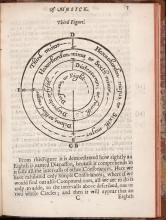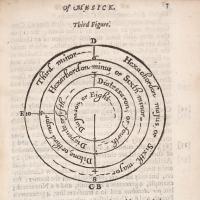 René Descartes (1596–1650) is primarily remembered as a philosopher and scientist, one of the most influential of his time. His magnum opus was Discours de la méthode (1637) and his pithy phrase ‘cogito, ergo sum’ has come to exemplify the beginning of modern philosophical investigation. A copy of this seminal book is in the Fisher Library’s Walsh Collection (images can be viewed below). Descartes, however, wrote several other treatises and one of the scarcest is his Renatus Descartes excellent compendium of musick: with necessary and judicious animadversions thereupon. This work was written in 1618, when Descartes was twenty-two and just after he had met Isaac Beeckman, an enthusiastic and well-read scientific amateur who introduced him to some of the new attempts to combine mathematics and physics.
René Descartes (1596–1650) is primarily remembered as a philosopher and scientist, one of the most influential of his time. His magnum opus was Discours de la méthode (1637) and his pithy phrase ‘cogito, ergo sum’ has come to exemplify the beginning of modern philosophical investigation. A copy of this seminal book is in the Fisher Library’s Walsh Collection (images can be viewed below). Descartes, however, wrote several other treatises and one of the scarcest is his Renatus Descartes excellent compendium of musick: with necessary and judicious animadversions thereupon. This work was written in 1618, when Descartes was twenty-two and just after he had met Isaac Beeckman, an enthusiastic and well-read scientific amateur who introduced him to some of the new attempts to combine mathematics and physics.
Although it is his earliest surviving work, the Compendium was not published until 1650, shortly after his death in Stockholm. The English translation was published in 1653 by William Brouncker, 2nd Viscount  Brouncker (1620–1684), a mathematician who became the first President of the Royal Society in 1662 and was a close friend of both Samuel Pepys and John Evelyn. He is named on the title page of the Compendium as a "Person of Honour" and his commentary, the "animadversions" on Descartes work constitute his only publication. They include an unsuccessful mathematical attempt to divide the diapason into seventeen equal semitones. Descartes’ study of the mathematical basis of music was also an examination of methodology: the application of empirical, deductive, and scientific approaches to the study of sensory perception. It is thus among the earliest attempts to define the dual relationship between the physical and psychological phenomena in music. It thus enhances the Fisher Library collections in the history of science, the history of philosophy, and the history of music.
Brouncker (1620–1684), a mathematician who became the first President of the Royal Society in 1662 and was a close friend of both Samuel Pepys and John Evelyn. He is named on the title page of the Compendium as a "Person of Honour" and his commentary, the "animadversions" on Descartes work constitute his only publication. They include an unsuccessful mathematical attempt to divide the diapason into seventeen equal semitones. Descartes’ study of the mathematical basis of music was also an examination of methodology: the application of empirical, deductive, and scientific approaches to the study of sensory perception. It is thus among the earliest attempts to define the dual relationship between the physical and psychological phenomena in music. It thus enhances the Fisher Library collections in the history of science, the history of philosophy, and the history of music.
